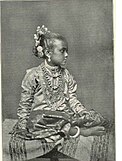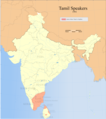Portal:Tamils
The Tamils portalThe Tamils (/ˈtæmɪlz, ˈtɑː-/ TAM-ilz, TAHM-), also known as the Tamilar, are a Dravidian ethnolinguistic group who natively speak the Tamil language and trace their ancestry mainly to the southern part of the Indian subcontinent. The Tamil language is one of the longest-surviving classical languages, with over two thousand years of written history, dating back to the Sangam period (between 300 BCE and 300 CE). Tamils constitute about 5.7% of the Indian population and form the majority in the South Indian state of Tamil Nadu and the union territory of Puducherry. They also form significant proportion of the population in Sri Lanka (15.3%), Malaysia (7%) and Singapore (5%). Tamils have migrated world-wide since the 19th century CE and a significant population exists in South Africa, Mauritius, Fiji, as well as other regions such as the Southeast Asia, Middle East, Caribbean and parts of the Western World.
Archaeological evidence from Tamil Nadu indicates a continuous history of human occupation for more than 3,800 years. In the Sangam period, Tamilakam was ruled by the Three Crowned Kings of the Cheras, Cholas and Pandyas. Smaller Velir kings and chieftains ruled certain territories and maintained relationship with the larger kingdoms. Urbanisation and mercantile activity developed along the coasts during the later Sangam period with the Tamils influencing the regional trade in the Indian Ocean region. Artifacts obtained from excavations indicate the presence of early trade relations with the Romans. The major kingdoms to rule the region later were the Pallavas (3rd–9th century CE), and the Vijayanagara Empire (14th–17th century CE). The island of Sri Lanka often saw attacks from the Indian mainland with the Cholas establishing their influence across the island and across several areas in Southeast Asia in the 10th century CE. This led to the spread of Tamil influence and contributed to the cultural Indianisation of the region. Scripts brought by Tamil traders like the Grantha and Pallava scripts, induced the development of many Southeast Asian scripts. The Jaffna Kingdom later controlled the Tamil territory in the north of the Sri Lanka from 13th to 17th century CE. European colonization began in the 17th century CE, and continued for two centuries until the middle of the 20th century. (Full article...) Selected article -Enthiran (transl. Robot) is a 2010 Indian Tamil-language science fiction action film co-written and directed by S. Shankar. It is the first installment in the Enthiran film series. The film stars Rajinikanth in the main dual lead role as a scientist and the robot he created. Aishwarya Rai Bachchan, Danny Denzongpa, Santhanam and Karunas play supporting roles. The soundtrack album and background score were composed by A. R. Rahman while the dialogues, cinematography, editing and art direction were handled by Madhan Karky, R. Rathnavelu, Anthony and Sabu Cyril respectively. The story revolves around the struggle of a scientist named Vaseegaran to control his sophisticated android robot named Chitti, after Chitti's software is upgraded to give it the ability to comprehend and exhibit human emotions and to commission it to the Indian Army. The project backfires when Chitti falls in love with Vaseegaran's girlfriend Sana, and is manipulated by Vaseegaran's mentor Bohra into becoming homicidal. After being stalled in the development phase for nearly a decade, the film's principal photography began in 2008 and lasted two years. The film marked the debut of Legacy Effects studio (which was responsible for the film's prosthetic make-up and animatronics) in Indian cinema. Enthiran was released worldwide on 1 October 2010. Produced by Kalanithi Maran, it was the most expensive Indian film at the time of its release. (Full article...) General imagesSelected biography -Valangaiman Sankaranarayana Srinivasa Sastri CH PC (22 September 1869 – 17 April 1946) was an Indian politician, administrator, educator, orator and Indian independence activist. He was acclaimed for his oratory and command over the English language. Srinivasa Sastri was born to a poor temple priest in the village of Valangaiman near Kumbakonam, India. He completed his education at Kumbakonam and worked as a school teacher and later, headmaster in Triplicane, Madras. He entered politics in 1905 when he joined the Servants of India Society. Sastri served as a member of the Indian National Congress from 1908 to 1922, but later resigned in protest against the non-cooperation movement. Sastri was one of the founding members of the Indian Liberal Party. In his later days, he was strongly opposed to the partition of India. Srinivasa Sastri served as a member of the Madras Legislative Council from 1913 to 1916, Imperial Legislative Council of India from 1916 to 1919 and the Council of State from 1920 to 1925. Sastri also functioned as India's delegate to the League of Nations, as member of the Privy Council of the United Kingdom and agent to the Union of South Africa. (Full article...) CategoriesTopicsTamil People Countrywide: India • Sri Lanka • Canada • Malaysia • Singapore • South Africa • England Related Ethnic Groups: Brahui • Gond • Kannadiga • Khonds • Kodava • Oraon • Malayali • Telugus • Tuluvas Related indigenous Groups: Badagas • Toda • Kuruba
See also: List of Tamil people, Tamil script, Tamil Script Code for Information Interchange Related portalsWikiProjectsThings to do
Associated WikimediaThe following Wikimedia Foundation sister projects provide more on this subject:
Discover Wikipedia using portals
|


























































